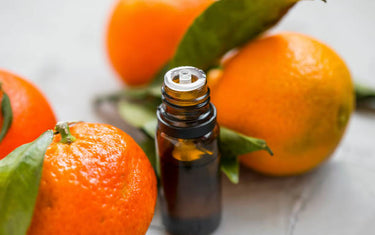9 min read / 28 October 2023 / yasmin sharp
7 Best Essential Oils for Inflammation
Explore the natural healing power of essential oils with our guide to the 7 best choices for soothing inflammation.

Using essential oils for inflammation can provide a natural way to address a wide range of ailments and conditions.
Whether you're seeking relief from sore, swollen muscles or looking to ease stress-related inflammation, essential oils for muscle pain offer a chemical-free alternative that allows you to continue with your day while supporting your body's recovery.
If you're wondering what essential oils are good for pain, we've compiled a list of the best anti-inflammatory essential oils you can try at home, giving you plenty of natural options to choose from.
What is inflammation?Inflammation occurs in the body when blood cells are sent out by the immune system to heal an injury or combat bacteria. For example, inflammation can appear as a reaction to food poisoning or if your body is trying to fight an infection. This does not mean that inflammation is always a good thing, as there can be times when your body may not be clear on what it needs to fight off. In some instances, this could cause issues with other parts of your body or even tire out your immune system. |
Are essential oils good for inflammation?
Antioxidants can be helpful in reducing the harmful effects of bodily inflammation.
This is important to know, as there are lots of essential oils containing antioxidants that can be used to reduce inflammation.
Research into using essential oils for inflammation is ongoing, although some studies have found that some do contain anti-inflammatory properties.
Scientists found that the COX-2 enzyme was reduced by at least 25% when certain essential oils were applied to swollen skin.
The COX-2 enzyme is generally considered to be the most appropriate target for anti-inflammatory drugs.

What are the best essential oils for inflammation?
The anti-inflammatory essential oils mentioned below could help to reduce inflammation on your body:
1. Thyme essential oil can help heart disease and oral health
Thyme oil is considered to be one of the most effective anti-inflammatory essential oils, with lab results showing that it could reduce the COX-2 enzyme by up to 75%.
According to research conducted in 2010, scientists found that the carvacrol in thyme provided certain cardioprotective qualities.
By working as an anti-inflammatory agent, this means that it could be beneficial for people coping with a variety of heart diseases.
Thyme also contains a component called thymol, which has been shown to be effective at reducing infection and inflammation.
For example, one study demonstrated that thymol could be beneficial for oral health.
This has been picked up on by some brands such as Listerine, who use thymol in their mouthwash formulas.
2. Fennel essential oil is rich in antioxidants
Fennel essential oil contains vitamin C, which can work as a potent antioxidant in your body.
This can play an important role in ensuring your body has enough protection against cellular damage caused by free radicals.
If there are no safeguards in place against free radicals, this can affect healthy cells and lead to bodily inflammation.
Oxidative stress can also be a cause of inflammation, especially during the process of fighting invading germs, as free radicals are produced by macrophage immune cells.
And according to research, when fennel is used in a concentrated form (fennel seed extract) flavonoids such as quercetin may be able to reduce inflammation.
3. Eucalyptus essential oil may ease joint pain
One of the best essential oils for joint pain and inflammation is eucalyptus oil. This is based on research that suggests the oil provides pain relief when applied topically.
In fact, you may find eucalyptus oil listed in some over-the-counter creams that are designed to reduce pain caused by conditions like osteoarthritis and rheumatoid arthritis.
Some also believe that the oil can be used to treat other conditions.
For example, if you are recovering from a muscle or joint injury or are experiencing back pain.
However, before you use eucalyptus oil to treat any joint or muscle pain, you should speak with your doctor to ensure it is right for you.

4. Clove essential oil contains natural anti-inflammatory properties
Clove essential oil contains a component called eugenol, a common ingredient often found in toothpastes, mouthwashes and medications recommended by dentists.
Eugenol helps to reduce swelling and irritation in the affected area.
Researchers have investigated this claim and found that toothpastes containing eugenol proved to be more effective at combating inflammation, infection and pain than a placebo.
5. Bergamot essential oil compounds could offer pain relief
Researchers looking into the properties contained in bergamot essential oil have found that several compounds can help with inflammation and wound healing.
For example, an animal study published in 2018 that focused on rats recovering from non-alcoholic fatty liver disease found that the polyphenols in bergamot helped to ease inflammation in the liver.
The carvacrol and linalool compounds also help to make bergamot one of the most effective essential oils for pain relief.
A 2017 review of studies noted that when the oil was applied to the skin, carvacrol and linalool produced anti-inflammatory, anticonvulsant and analgesic capabilities.
6. Rose essential oil may reduce post-surgery pain
Studies into essential oils for pain relief continue to produce interesting and promising results.
For example, postoperative children participating in a study were asked to inhale rose oil or almond oil.
A significant decrease in pain levels was seen in children that inhaled rose oil, which researchers believe was due to a significant release of endorphins.
When drawing up their conclusions, researchers stated that aromatherapy using rose oil could help to reduce pain in patients who are recovering from surgery.
7. Ginger essential oil can reduce swelling and inflammation
An animal study published in 2019 stated that ginger extract was able to prevent weight increases, whilst also decreasing markers of inflammation, in obese mice.
Similar results were also produced in a 2018 study, with researchers finding that ginger essential oil helped to protect rat kidneys that had been treated with toxin cadmium.
Certain properties were able to prevent unwanted changes occurring in molecules and kidney function markers linked to inflammation.
And when ginger essential oil was injected into rats with rheumatoid arthritis, although acute joint swelling was not reduced, it was able to significantly inhibit chronic joint swelling.

What is the strongest anti-inflammatory essential oil?
While several essential oils possess anti-inflammatory properties, thyme essential oil stands out as one of the most potent essential oil for inflammation.
Research has shown that thyme oil can reduce the COX-2 enzyme, which is associated with inflammation, by up to 75%.
This remarkable efficacy makes it a top choice for those seeking strong anti-inflammatory effects.
Thyme oil contains carvacrol, which has demonstrated cardioprotective qualities, potentially benefiting those with heart diseases.
Additionally, its component thymol has proven effective in reducing infection and inflammation, particularly in oral health applications.
However, it's important to note that the strength of an essential oil's anti-inflammatory properties can vary depending on the specific condition and individual response.
Always consult with a healthcare professional before using essential oils for medicinal purposes, especially for severe or chronic inflammation.
How to use anti-inflammatory essential oils
There are a few ways you can use essential oils for inflammation, such as:
Topical application
After diluting the essential oil with a carrier oil of choice (this equates to 2-3 drops of essential oil per teaspoon of carrier oil), simply apply to the affected area.
You can also try it as a massage balm, gently rubbing the mixture into the skin so it can help ease inflammation and joint pain.
Diffusion
Diffusion is another great way to enjoy the anti-inflammatory benefits of essential oils.
This involves simply adding a few drops to your diffuser or oil burner and letting the aroma disperse into the surrounding space.
Inhaling the scent can help you relax, which can be a great help if the inflammation is stress related.
Find out more about safely diffusing essential oils in our guide.
Baths
Adding essential oils to a bath could help ease some inflammatory conditions, whilst also creating a stress-free atmosphere.
Before adding essential oils to warm bath water, you should first dilute it with a carrier oil to reduce the chances of experiencing an allergic reaction.
Soaps and candles
When included in a soap recipe, essential oils can provide some of the benefits you receive when they are applied topically.
This is also true of candle recipes, with the fragrance spreading into the room to create a calming and relaxing environment.
Are there any risks to using essential oils for inflammation?
If you notice inflammation on your body, it is a sign that your body is distressed and in need of support.
However, it is never advisable to self-diagnose and use essential oils to treat swollen and inflamed skin, as it could be a sign of something serious developing in your body.
If you notice inflammation, you should first speak with your doctor so they can diagnose and provide proper medical care.
Mention that you would like to use an essential oil as a complementary treatment, and they can offer advice on whether it is appropriate.
Before trying any essential oil for the first time you should complete a patch test. This will let you know if you are sensitive to a particular oil or perhaps even allergic to it.
To complete a patch test, add a few diluted drops to the inside of your elbow (if there is no inflammation present).
Cover with a plaster for 24 hours and if you do not experience any inflammation, redness or any other form of irritation, the oil should be fine to use.

Essential oils have been used by people for hundreds of years to treat and ease minor causes of inflammation.
Thyme, ginger, bergamot, rose, clove, fennel and eucalyptus give you plenty of options and some can even provide relief from joint pain.
If you notice inflammation on your body, you should first speak with your doctor to ensure it is nothing serious.
If you are given the green light, there are lots of ways to use essential oils, be it through massage, diffusion, in a relaxing warm bath or via a homemade soap or candle.
Sign up for a wholesale account today to benefit from significant savings on our range of essential oils!










